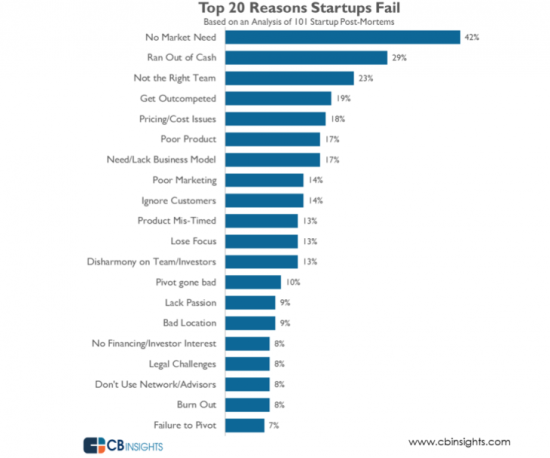La semaine dernière, nous évoquions les causes principales de l’échec des startups en mentionnant les causes liées principalement à leur stratégie marketing. Si cet aspect n’est pas souvent la priorité de la plupart des entreprises débutantes, nous verrons comment le perçoivent a posteriori les porteurs des projets qui ont échoués.
CB Insights ne s’est pas contenté de mener une simple enquête/baromètre auprès de startups ayant échoué. C’est après avoir réalisé 101 entretiens auprès de dirigeant de startups belles et bien mortes, que le site a analysé le contenu textuel des entretiens [du type analyse sémiologique & enquête quali]. Le résultat ? Comme nous vous l’avions précisé, beaucoup de facteurs marketing et, bien sur, des facteurs humains et financiers (pour le détail de l’enquête, retrouvez le lien dans notre précédent article).
Les facteurs marketing qui sont pointés dans ce dossier sont donc, malheureusement sans grande surprise, plutôt symptomatique de l’univers startups. Voici les trois extraits (en Anglais) du dossier, le moins que l’on puisse dire, c’est qu’après avoir lu ceux-ci, les entrepreneurs seront probablement plus tentés de faire appel à des consultants en marketing !
#1 – Building a solution looking for a problem, i.e., not targeting a “market need”
Tackling problems that are interesting to solve rather than those that serve a market need was cited as the number one reason for failure in a notable 42% of cases. As Patient Communicator wrote, “I realized, essentially, that we had no customers because no one was really interested in the model we were pitching. Doctors want more patients, not an efficient office.” Treehouse Logic applied the concept more broadly in their post-mortem, writing, “Startups fail when they are not solving a market problem. We were not solving a large enough problem that we could universally serve with a scalable solution. We had great technology, great data on shopping behavior, great reputation as a though leader, great expertise, great advisors, etc, but what we didn’t have was technology or business model that solved a pain point in a scalable way.
#8 – Poor Marketing
Knowing your target audience and knowing how to get their attention and convert them to leads and ultimately customers is one of the most important skills of a successful business. The inability to market was a function of founders who liked to code or build product but who didn’t relish the idea of promoting the product and came up in 14% of the startup post-mortems. As Overto wrote, “Thin line between life and death of internet service is a number of users. For the initial period of time the numbers were growing systematically. Then we hit the ceiling of what we could achieve effortlessly. It was a time to do some marketing. Unfortunately no one of us was skilled in that area. Even worse, no one had enough time to fill the gap. That would be another stopper if we dealt with the problems mentioned above.”
#9 – Being inflexible and not actively seeking or using customer feedback
Ignoring users is a tried and true way to fail. Tunnel vision and not gathering user feedback are fatal flaws for most startups. For instance, eCrowds, a web content management system company, said that “We spent way too much time building it for ourselves and not getting feedback from prospects — it’s easy to get tunnel vision. I’d recommend not going more than two or three months from the initial start to getting in the hands of prospects that are truly objective.”
Similarly, VoterTide wrote, “We didn’t spend enough time talking with customers and were rolling out features that I thought were great, but we didn’t gather enough input from clients. We didn’t realize it until it was too late. It’s easy to get tricked into thinking your thing is cool. You have to pay attention to your customers and adapt to their needs.”

